Innovation, indeed, is what we have seen in 2003 in the dairy foods category. The refrigerator, freezer and ambient-temperature shelves at grocery stores have made space for an array of highly innovative dairy products. And, because it's that time of year when Dairy Foods magazine likes to recognize the top new products of the year, the following pages are dedicated to putting these innovations in the spotlight.
The Dairy Foods staff, along with various industry relations, identified six product lines that represent some of the most promising new dairy and dairy-based foods. Some of these items you have read about before in Dairy Foods. For others, this is their first mention. What makes them all stand out is how different they truly are from any other products in the marketplace.
Also this year, Dairy Foods recognizes LeCarb, SouthWest Foods, Tyler, Texas, as the Best New Products Company of the Year. LeCarb has grown from a low-carbohydrate frozen dessert line that was only available through SouthWest Dairy's Brookshire grocery store chain, to include dairy drinks, cultured products, and most recently, frozen novelties. Many of these products are being sold on a national basis through retail giants such as Albertson's Inc., Boise, Idaho; Safeway Inc., Pleasanton, Calif; and Wal-Mart Stores Inc, Bentonville, Ark.
LeCarb is designed to provide the epidemic number of obese and diabetic individuals in America today with good-tasting, nutritious, low-carbohydrate alternatives to traditional dairy foods.
Dairy Foods magazine congratulates the 2003 winners, and encourages dairy processors to continue adding value to dairy products through innovation. Follow the trends. Know your target customer. Do market research. Invest in research and development. And remember, to be competitive, you must play the game.

Milk Formulated for Growing Kids' Needs
Adults are increasingly aware of the role nutrition plays in health and wellness. When it comes to feeding their children, adults are choosing foods that ensure proper growth, brain development and energy throughout the day, as well as instill good eating habits for life.The new Borden® Kid Builder™ 1% low-fat milk line from National Dairy Milk Products LP, Dallas, is milk formulated for growing kids' needs. And because it tastes great, kids get hooked on milk as a beverage for life. Kid Builder milks debuted in the Texas market in March 2003.
"Kid Builder milk comes in three flavors-white, chocolate and a rotating third. The original line had vanilla. Now the third flavor is strawberry," says Ray Platter, executive v.p. "What's ex-citing about this line and its roll-out market is that Texans traditionally do not like lower-fat milk. Yet, Kid Builder is doing well and is out-performing Borden nonfat white and chocolate milks.

The white and chocolate varieties come in plastic gallon and half-gallons cartons. The third flavor only comes in half-gallons. "In June, we introduced 12-oz plastic bottles for the c-store and foodservice side of the business," Platter says. "This is a huge growth opportunity."
Kid Builder contains 10% more of the Daily Value (DV) for calcium than regular low-fat milk, along with two extra grams of protein. Regular low-fat milk has no vitamin C, yet Kid Builder has 25% of the DV for vitamin C, as well as of vitamin E. Regular low-fat milk contains a mere 4% DV vitamin E.
"Milk is the ideal carrier for the value-added ingredients and nutrients a growing child needs," Platter concludes. "Parents feel good about providing healthy food for their families."
The company recently grew the Kid Builder line with fortified frozen novelties for kids. They have the same nutritional attributes as the milk and also serve as a healthful treat. Thanks for helping improve the health of kids.
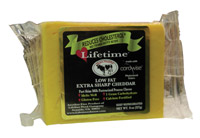
Cheese that Helps Lower Cholesterol
Cheese has traditionally been one of the first foods a person gives up when they discover their cholesterol is high. Thanks to Lifeline Food Co., Seaside, Calif., this no longer is the case."We reformulated our Lifetime® Low Fat Cheese to include phytosterol esters," says Jone Chappell, pres. "A single 1-oz serving of the cheese, which comes in Cheddar, extra sharp Ched-dar, jalapeno Jack and mozzarella, contains 0.65g phytosterols. A serving at two meals provides the recommended amount to reap the cholesterol-lowering benefits of phytosterols."
"Phytosterols are natural compounds derived from plants and are recognized for reducing blood cholesterol. Based on data from various studies, daily intake of at least 1.3g phytosterols as part of a diet low in saturated fat and cholesterol helps lower blood cholesterol, therefore reduces the risk of heart disease.
"When developing the cheeses, "In order to make the ‘reducing cholesterol' claim, there could be no more than 1g of saturated fat in the cheese. The low-fat product fit the bill, and after several trials, we decided to add the phytosterols to our low-fat pasteurized product," she says.

"The Lifetime cheeses are made with CoroWise™ phytosterols, with front labels boldly displaying the CoroWise logo. The supplier of CoroWise is actively promoting and educating consumers about the benefits of phytosterols in the diet. Phytosterols help lower blood cholesterol because they are structurally similar to cholesterol, and consequently, compete with ingested cho-lesterol for absorption through the small intestine. In essence, the more phytosterols present in the gastrointestinal tract following a meal, the less likely cholesterol absorption will occur. Interest-ingly, phytosterols themselves are not absorbed to any appreciable extent. They simply block cholesterol absorption and get flushed through the intestines.
"The new Lifetime Low Fat Cheeses with Phytosterols are part of the trend in making tra-ditional foods healthier through the addition of value-added ingredients.

Milk-based Soft Drink Gets Young Adults Drinking More Milk
About three years ago, a small group from Dr. Pepper/Seven Up Inc. (DPSU), Plano, Texas, and its U.K-based parent company Cadbury Schweppes plc, began exploring what dairy opportu-nities might exist for DPSU. "The development process started with the identification of available technologies, as well as developing technologies such as low-acid aseptic in plastic bottles," says Eric Gold, dir. of project engineering and innovation.This past March, DPSU introduced Raging Cow™, a five-flavor line of 14-oz single-serve milk drinks, and the result of those early brainstorming sessions. The initial rollout was in Texas and the Midwest, with national distribution targeted for mid- to late-2004.
Milk is the main ingredient in Raging Cow, and labels sport the Real Seal, meaning it con-tains more than 51% milk. When kids choose a bottle of Raging Cow over a can of cola, they are consuming at least 7 oz of milk, which is a great way to increase milk consumption amongst this bone-building consumer segment.
What sets Raging Cow a part from other flavored milks and dairy drinks is the fact that it is the first milk beverage to be bottled on the recently FDA-accepted commercial low-acid aseptic plastic bottle line at Jasper Products, Joplin, Mo.
"The importance of shelf stability was a key to the design of the product in order to best support DPSU's route-to-market, which is unrefrigerated," Gold says. The choice of plastic for this aseptic format was identified as a risky path given that the technology was still under devel-opment; however, this path was chosen, in part to avoid being a ‘me-too' dairy drink, such as those in aseptic boxes, retort cans and retort glass bottles."
Raging Cow is unique with its closure, too. "The flip-top can be opened and closed with one hand, doesn't require the removal of the closure to remove the induction seal and opens a full 220 degrees to prevent the closure from touching your face during consumption," Gold says. "We have received positive feedback on all these attributes.
"Consumers that have tasted Raging Cow love it," Gold concludes. "And the trade is en-thusiastic about it because it is new and different."
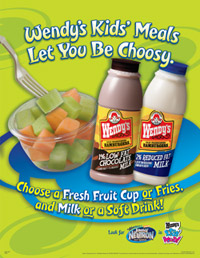
Finally, A Cool Beverage Offering in Kids' Meals
Anyone with picky-eating young children knows that when all else fails, hard-to-please youngsters will typically eat a fast-food children's meal. The downside with these meals is not the useless toy that accompanies them; it's the beverage selection. Yes, milk, in cartons, is usually available. But compared to the "cool" fountain drinks, white milk (as other flavors are seldom of-fered) is not a fussy-eater's preference.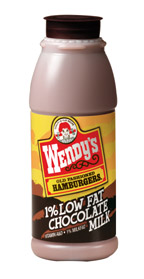
In mid-September, these single-serve bottles of milk, which are supplied to Wendy's by Dean Foods Co., Dallas, were made available as Kids' Meal beverage options at 420 Wendy's restaurants in Columbus, Ohio; Miami; Philadelphia; and Raleigh, N.C. This four-market test of the bottles will hopefully lead to a nationwide rollout very soon.
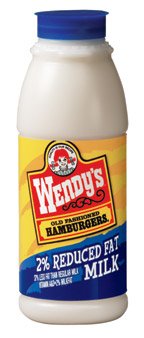
"Since day one, Wendy's has been known as a place for families," says Tom Mueller, pres. and COO. "We don't take this loyalty lightly, and we're actively working to further enhance our menu with quality options that kids want and parents appreciate."
Wendy's is the first fast-food chain to offer milk in the innovative grab-and-go packaging.
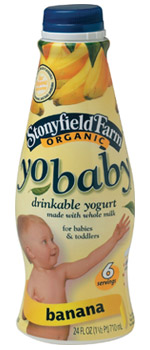
Babies Get Their Own Smoothies
Stonyfield Farm, Londonderry, N.H., makes the winners' list again by formulating a smoothie just for little ones."The concept of a drinkable version of YoBaby™ was conceived after the initial rollout of our Smoothie line," says Katie Hyland, mgr., R&D. "Having helped ignite the current drinkable yogurt craze, we were seeking out ways to extend the drinkable format; YoBaby was a logical choice."
Jennifer Sgroi, R&D project leader adds, "Key development factors included taste and viscosity. For taste, we wanted to ensure that the drinkable product scored as good or better than the same flavors in the cup line.
"Viscosity was also important given the increase in milkfat compared to the Smoothie formulation," Sgroi adds. "We had to ensure it would not get too thick, which would negatively impact taste, drinkability and usability in the ubiquitous sippy cup. One of the most fun facets of the project was tasting various samples from sippy cups . . . everyone got to be a kid again!"
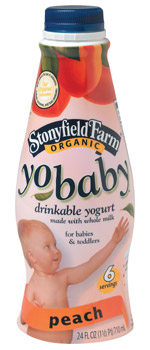
"Broader grocery availability will happen in early January 2004," says Pete Lewis, pro-ject mgr. "We are supporting the two-flavor (banana and peach) line with an array of advertising including an on-pack offer that gives consumers a free YoBaby branded sippy cup with two proofs of purchase and $1 shipping and handling.
"Consumers and customers alike have raved about the YoBaby drink," Lewis says. "Con-sumers like the convenience of being able to pour just the right amount into their little one's sippy cup, and are happy that they are serving their kid something they like that is very healthy for them."
Gary Hirshberg, pres. and CEO concludes, "At Stonyfield Farm, innovation has always been at the forefront of our product development and YoBaby Drinkable Yogurt is no exception."
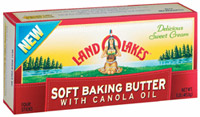
Keeping Consumers Using Butter by Making it Easier to Use
Nothing beats the sweet cream taste of butter. Yet for some consumers, that great taste is just not enough for them to buy butter for their toast or for baking, as these consumers want their yel-low spread to be soft and spreadable-right from the refrigerator.That's now possible thanks to Arden Hills, Minn.-based Land O'Lakes Inc. (LOL), which fulfilled this consumer desire in June with the introduction of Land O Lakes® Spreadable Butter with Canola Oil and Land O Lakes Soft Baking Butter with Canola Oil. Both products were un-der development for a few years and went through rigorous market research testing to make sure the product delivers the taste of butter and performs as expected. Made with LOL butter and a small amount of canola oil, both of which are trans fat free, consumer response to the products is overwhelming positive, according to LOL.
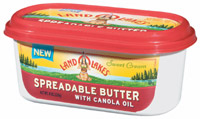
"LOL Spreadable Butter with Canola Oil is one of those innovations and we're excited about the early customer and consumer response," Policinski says.
Research results showed very strong purchase intent for both products, with 85% of re-spondents agreeing the spreadable butter is easy to spread, and 81% agreeing the baking butter is easy to use because it is soft/ready-to-use from the refrigerator.
"Both of these new products will allow more consumers to use more butter more fre-quently and grow both our businesses and the demand for dairy-based products." Just what the industry needs!
Click here for our "New Products Company of the Year: LeCarb" story.